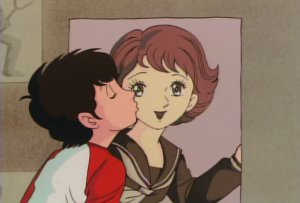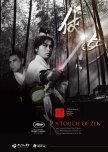This review may contain spoilers
‘So...if I believe in ghosts, then they exist...’
*Released in the early 1970s and regarded as the masterpiece of Hong Kong master King Hu, ‘A Touch of Zen’ had the great merit of updating a genre, the ‘classic’ wuxia, condensing within it, thanks also to its majestic but never really ‘heavy’ duration (180'), some of the most beautiful aspects of Chinese cinematography, today clearly re-proposed by contemporary filmmakers from the immense Asian territory, and by all those directors (Quentin Tarantino among the most devoted fans, for instance) faithful descendants of the great oriental film tradition.
It is indeed difficult to speak of a simple adventure movie, because of the mixture of genres that runs through the picture, the repeated jumps from farcical to extremely dramatic tones, the astonishing action sequences alternating with more ‘reflective’ moments (‘definitely Zen’) make ‘A Touch of Zen’ a polyhedral work, multifaceted and therefore truly unforgettable.
Rich in symbols, allegories, even ‘arcane’ elements, always and in any case fascinating, immersed in an environmental setting rich in natural beauty, with an elegant and ingenious use of the camera and a picture capable of emphasising the contrasts, the numerous chromatic nuances (red, black and white, mainly) and alternating day/night sequences, the movie is a real feast for the eyes.
King Hu drew inspiration from a short story by the novelist Pu Songling, whose works have provided material for numerous Asian filmmakers, but it is clear that Hu, with his innovative stylistic choices, decisively marked the modernisation of the Wuxia genre, influencing generations to come (consider that the film's genesis dates back to around 1969...).
And thanks to the director's exemplary ability to synthesise, to the singularity of many sequences, even long ones, which are extremely descriptive and often dialogue-free, the observer is led almost to a kind of identification that puts him completely in the spirit of the work...
The beginning, in an almost western style (à la Leone, to be clear) immediately introduces us to one of the main characters in the story, the painter Gu; a curious observer at first, and then gradually more and more interested in the ‘strange’ pursuits that seem to enliven the sleepy town in which he carries out his occupation...It is very interesting to note how precisely the characterisation of this figure (extremely ‘modern’ in his conception of life) gradually takes on ever deeper nuances.
Also impressive is the Ghost Town (an old military fortress...) where all the characters live, which serves as the main theatre of the story: The painter in the company of his elderly mother, who continually ‘’vexes‘’ him, eager to see him settled:
‘You are 30 years old...You have to get married...get a career...I want to have grandchildren’!...
The mother-son duets willingly break the tension, bringing the film to more comic tones, even if they actually anticipate a development that is by no means banal in the evolution of the plot.
The beautiful Yang Hui-Chen, mysterious and silent, who, helped by the atmosphere of the place, is initially even mistaken by the painter for a ghost, as well as the blind peasant, whose real nature we later discover
Both figures can be considered classic, as they sum up many aspects found in numerous ‘genre’ movies, not only Chinese, but also Japanese...And if at the base of the story there is always the ‘old and healthy’ sense of revenge, it is skilfully melded with certain aspects of Zen ethics that accentuate its chivalrous nature; Precision and efficiency, discipline (which goes as far as asceticism), the noble spirit of loyalty, for example, are all at the core of the main characters' souls and determine their actions...
The Ghost Town, it was said:
During daytime, this former fortification looks like a simple assemblage of crumbling buildings, a refuge for the poor and outcast, At night, it truly appears as a place haunted by ghosts, where noises, shadows and creaks can create suspense and even fright...
Magistral from this point of view, the long sequence of the night battle, shot with an almost natural effect, where the sounds and lamentations, the screams of the fight imply a situation that will only be revealed to us at dawn, with an outcome that is both suggestive and highly dramatic...Cunning and strategy, supported by the ancestral fear of ghosts (‘Sir! the houses are haunted by spirits! ...’), against the numerical superiority of the enemy. It is evident, in this respect, how much ‘A Touch of Zen’ influenced a more recent Hong Kong classic such as “A Chinese Ghost Story”.
And over the three hours you can admire:
- Ironclad duels with jumps and evolutions that defy the laws of gravity...
- Swords with extremely strong blades that can, if necessary, act as trampolines to scale the highest walls...
- Others so flexible (yet lethal) that they can be fastened around the waist, like a belt
- A fight to the death in the middle of the forest that makes you realise how much movies like “Crouching Tiger, Hidden Dragon”, “Hero” and “House of Flying Daggers” owe to A Touch of Zen
- Bows capable of shooting numerous arrows at once
- A villainous commander-in-chief, capable of thwarting our heroes, skilled swordsmen, with only the strength of his hands
- A group of Zen monks armed only with faith (and strong ropes...), led by a master capable of taming the fiercest of enemies with a simple whisper
And so on…
So many amazing elements that constantly relaunch the story, with the aforementioned alternation of rhythm and atmosphere.
The closing, which I have no hesitation in describing as mystical, visionary, with almost psychedelic stylistic overtones, has in itself a truly majestic strength and suggestion...It may leave one doubtful, perplexed, because it does not provide a clear explanation, but there is no doubt that it is visually astounding and that, even from an iconographic point of view, it can open up to the most ‘extensive’ meanings
Majestic, sophisticated, breathtaking but also contemplative, adventurous and captivating, ‘A Touch of Zen’ is a masterpiece that leaves no one indifferent, and is therefore recommended to everyone.
10/10
--------------------------------------------------------------------------------------------------------------------------------------
*I took the liberty of reproposingt an ‘old’ review of mine that appeared many years ago on a forum that no long exists...
It is indeed difficult to speak of a simple adventure movie, because of the mixture of genres that runs through the picture, the repeated jumps from farcical to extremely dramatic tones, the astonishing action sequences alternating with more ‘reflective’ moments (‘definitely Zen’) make ‘A Touch of Zen’ a polyhedral work, multifaceted and therefore truly unforgettable.
Rich in symbols, allegories, even ‘arcane’ elements, always and in any case fascinating, immersed in an environmental setting rich in natural beauty, with an elegant and ingenious use of the camera and a picture capable of emphasising the contrasts, the numerous chromatic nuances (red, black and white, mainly) and alternating day/night sequences, the movie is a real feast for the eyes.
King Hu drew inspiration from a short story by the novelist Pu Songling, whose works have provided material for numerous Asian filmmakers, but it is clear that Hu, with his innovative stylistic choices, decisively marked the modernisation of the Wuxia genre, influencing generations to come (consider that the film's genesis dates back to around 1969...).
And thanks to the director's exemplary ability to synthesise, to the singularity of many sequences, even long ones, which are extremely descriptive and often dialogue-free, the observer is led almost to a kind of identification that puts him completely in the spirit of the work...
The beginning, in an almost western style (à la Leone, to be clear) immediately introduces us to one of the main characters in the story, the painter Gu; a curious observer at first, and then gradually more and more interested in the ‘strange’ pursuits that seem to enliven the sleepy town in which he carries out his occupation...It is very interesting to note how precisely the characterisation of this figure (extremely ‘modern’ in his conception of life) gradually takes on ever deeper nuances.
Also impressive is the Ghost Town (an old military fortress...) where all the characters live, which serves as the main theatre of the story: The painter in the company of his elderly mother, who continually ‘’vexes‘’ him, eager to see him settled:
‘You are 30 years old...You have to get married...get a career...I want to have grandchildren’!...
The mother-son duets willingly break the tension, bringing the film to more comic tones, even if they actually anticipate a development that is by no means banal in the evolution of the plot.
The beautiful Yang Hui-Chen, mysterious and silent, who, helped by the atmosphere of the place, is initially even mistaken by the painter for a ghost, as well as the blind peasant, whose real nature we later discover
Both figures can be considered classic, as they sum up many aspects found in numerous ‘genre’ movies, not only Chinese, but also Japanese...And if at the base of the story there is always the ‘old and healthy’ sense of revenge, it is skilfully melded with certain aspects of Zen ethics that accentuate its chivalrous nature; Precision and efficiency, discipline (which goes as far as asceticism), the noble spirit of loyalty, for example, are all at the core of the main characters' souls and determine their actions...
The Ghost Town, it was said:
During daytime, this former fortification looks like a simple assemblage of crumbling buildings, a refuge for the poor and outcast, At night, it truly appears as a place haunted by ghosts, where noises, shadows and creaks can create suspense and even fright...
Magistral from this point of view, the long sequence of the night battle, shot with an almost natural effect, where the sounds and lamentations, the screams of the fight imply a situation that will only be revealed to us at dawn, with an outcome that is both suggestive and highly dramatic...Cunning and strategy, supported by the ancestral fear of ghosts (‘Sir! the houses are haunted by spirits! ...’), against the numerical superiority of the enemy. It is evident, in this respect, how much ‘A Touch of Zen’ influenced a more recent Hong Kong classic such as “A Chinese Ghost Story”.
And over the three hours you can admire:
- Ironclad duels with jumps and evolutions that defy the laws of gravity...
- Swords with extremely strong blades that can, if necessary, act as trampolines to scale the highest walls...
- Others so flexible (yet lethal) that they can be fastened around the waist, like a belt
- A fight to the death in the middle of the forest that makes you realise how much movies like “Crouching Tiger, Hidden Dragon”, “Hero” and “House of Flying Daggers” owe to A Touch of Zen
- Bows capable of shooting numerous arrows at once
- A villainous commander-in-chief, capable of thwarting our heroes, skilled swordsmen, with only the strength of his hands
- A group of Zen monks armed only with faith (and strong ropes...), led by a master capable of taming the fiercest of enemies with a simple whisper
And so on…
So many amazing elements that constantly relaunch the story, with the aforementioned alternation of rhythm and atmosphere.
The closing, which I have no hesitation in describing as mystical, visionary, with almost psychedelic stylistic overtones, has in itself a truly majestic strength and suggestion...It may leave one doubtful, perplexed, because it does not provide a clear explanation, but there is no doubt that it is visually astounding and that, even from an iconographic point of view, it can open up to the most ‘extensive’ meanings
Majestic, sophisticated, breathtaking but also contemplative, adventurous and captivating, ‘A Touch of Zen’ is a masterpiece that leaves no one indifferent, and is therefore recommended to everyone.
10/10
--------------------------------------------------------------------------------------------------------------------------------------
*I took the liberty of reproposingt an ‘old’ review of mine that appeared many years ago on a forum that no long exists...
Was this review helpful to you?














